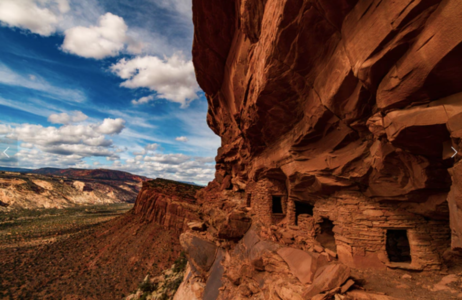SALT LAKE CITY (AP) — Lawsuits brought by conservation, tribal and paleontological groups challenging the constitutionality of President Donald Trump’s decision to shrink two Utah national monuments will remain in a court in Washington, D.C., after a judge on Monday denied the U.S. government’s request to move the cases to Salt Lake City.
Government officials were also ordered to give two days of notice to the groups suing before any ground disturbances, such as mining, occur within the boundaries of the original monuments, according to a decision issued by U.S. District Judge Tanya Chutkan pertaining to five lawsuits over the Bears Ears and Grand Staircase-Escalante national monuments. She didn’t elaborate on why she decided to keep the cases in Washington, D.C.
The Justice Department declined comment, said spokesman Wyn Hornbuckle. The agency’s lawyers argued in January that the interest in the cases in Utah outweighed the decision by the groups to sue in Washington, D.C.
Conservation groups applauded a decision they believe keeps the cases where they belong and moves them closer to a review of the root of the case: Whether Trump exceeded his authority. Past presidents have trimmed national monuments 18 times, but there’s never been a court ruling about whether the Antiquities Act allows that action.
In December, Trump downsized the Bears Ears National Monument by about 85 percent and Grand Staircase-Escalante National Monument by nearly half, following a review of 27 national monuments by Interior Secretary Ryan Zinke.
Trump said he was scaling back the two monuments to reverse federal overreach and had acted within his authority. He earned cheers from Republican leaders in Utah who lobbied him to undo protections by Democratic presidents that they considered overly broad.
Conservation and tribal groups described the Trump decision as the largest elimination of protected land in American history. They argue that shrinking the monuments jeopardized protections for irreplaceable archaeological sites and important lands. Outdoor retail company Patagonia also sued.
Heidi McIntosh, managing attorney with the conservation group Earthjustice, said she’s looking forward to making the case for why the reductions shouldn’t be allowed now that the venue decision has been made. She said the order calling on the government to give notice of land disturbances is important because while some mining requires permission, other exploratory work such as taking samples can be done without approvals.
“It makes sure that these are irreplaceable resources like the fossils you can find at Grand Staircase are protected while the lawsuit is pending,” McIntosh said.













